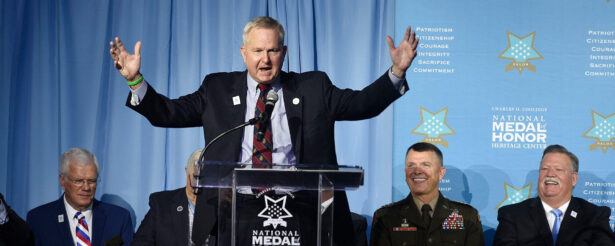What does it mean to me as an American to have served in the military?
I spent 39 years on active duty, moving my family 33 times. I was deployed to places across the globe where human rights and freedoms were denied and exploited. You couldn’t help but think about America’s Constitution and how our founders created a special form of government that guarantees our individual freedoms.
Serving, to me, meant I had the opportunity to invest in our democracy and protect our Constitution.
The first time I put on a military uniform was in the Army ROTC during my freshman year at the University of Chattanooga, as it was known back then.
The university was a land-grant institution, and students had to take band, physical education or ROTC during their first two years of school as a core requirement. I had played high school football on the Oak Ridge Wildcats team and had various pieces of my body pretty banged up, so I didn’t want to do PE. I couldn’t play an instrument, so I defaulted to ROTC.
Back in the day, a dormitory was built into the backside of the Chamberlain Field football stadium in the middle of campus. I still remember putting on the uniform, looking at myself in the mirror in the old stadium dorm and thinking how proud I hoped my father would be of me. He had gone through the World War II experience, and I believed then—as I do now—that my dad being proud of me was important and all I needed.
The uniform was very much respected and appreciated on campus. Our students were glad to see other students wearing the uniform. Our ROTC cadre—the grownups running ROTC—were all Vietnam veterans. Those of us who were youngsters in the program admired and respected them enormously for their service and sacrifice in that conflict.
When I took the uniform off many years later, it was in June 2008, and it was an emotional experience for me. The military was my way of life. I had gone from being just some guy out of Oak Ridge to a military professional for years and years.
When I took the uniform off after my retirement ceremony at Fort Knox, Kentucky, not to wear it again, all I could think about was that I might be letting down some of those great Americans with whom I would no longer be serving. Being with my fellow military service members in difficult, complex and even dangerous environments where we depended on one another for mission success—and in some cases for our lives—was all very special to me. Leaving was very difficult.
It’s strange, but it’s how you feel—whether you serve two years or 39 years. It’s emotional to put on the uniform and certainly emotional to take it off. Those were the bookends of all those years, and it was a great honor for me to have had the opportunity to serve our country.
Gen. B.B. Bell (Chattanooga ’69) retired from the U.S. Army as a four-star general.

